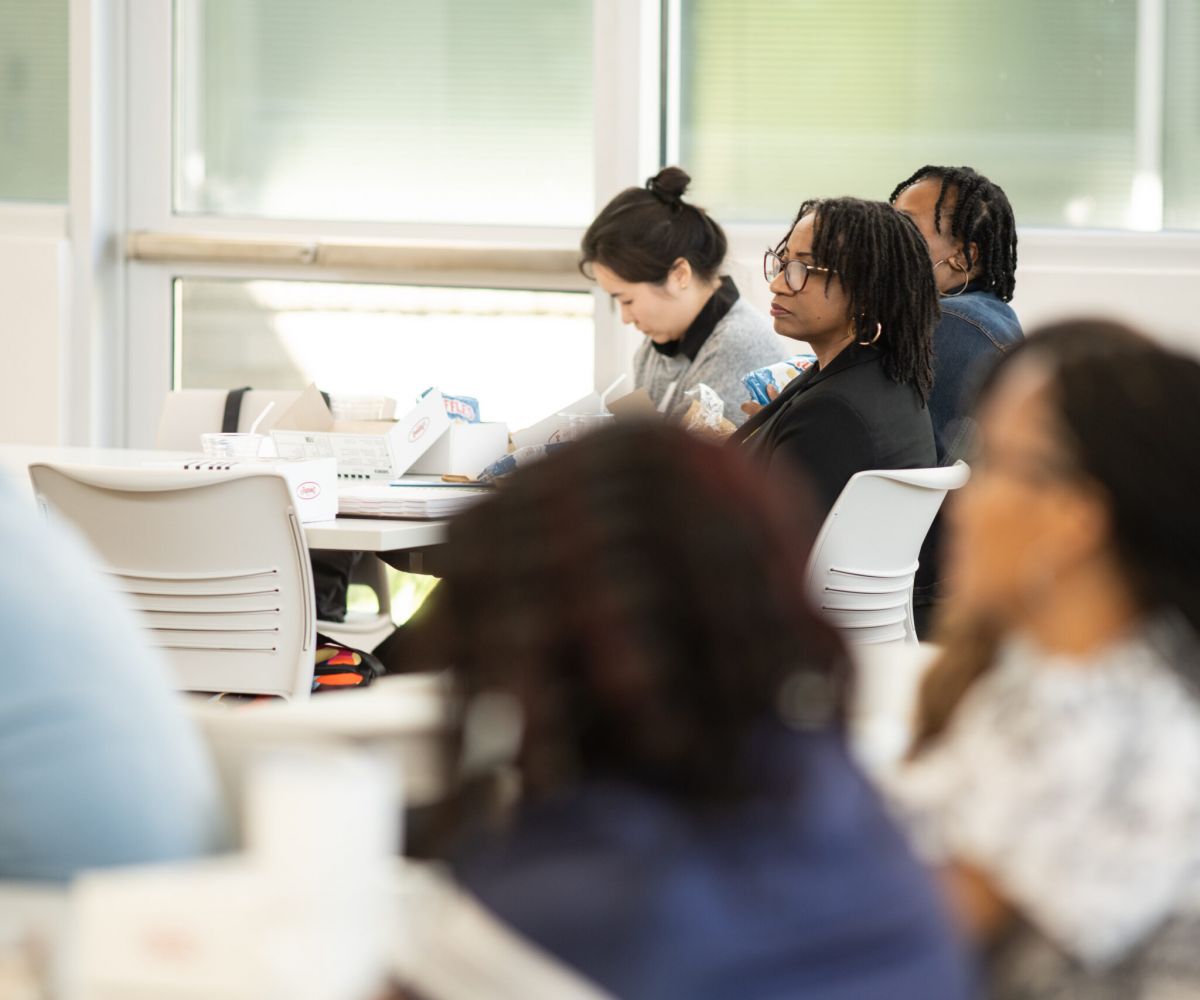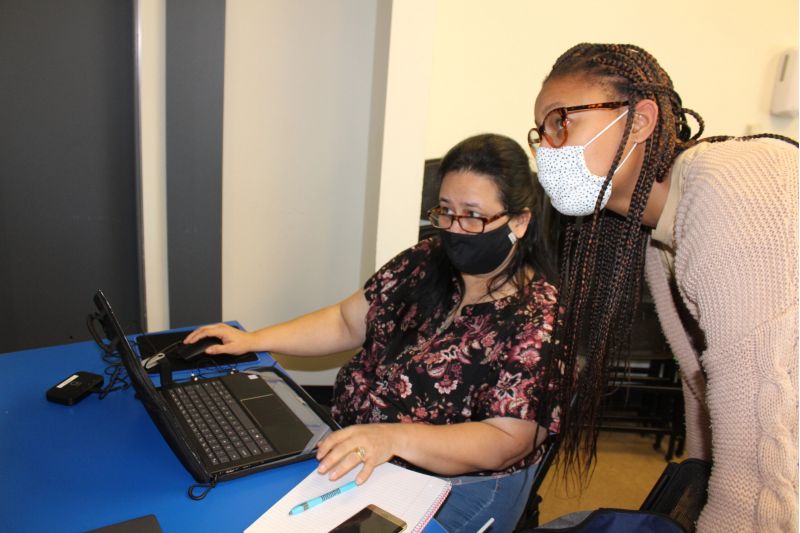Dollars for College Puts Low-Income Students on a Path to College

At United Way of Metropolitan Dallas, we’re proud of the impact our community has driven through Dollars for College, our partnership with Communities Foundations of Texas that expands access to college savings accounts to low- and moderate-income North Texans. Since we launched the program eight years ago, 1,044 students have opened savings accounts and deposits have reached $403,000, which means more young scholars are on the path for college attendance and completion.
On Sept. 24, we hosted the Dollars for College Community Summit to raise awareness of Dollars for College and invite more community organizations and school districts to join this important initiative. During this inspiring event, the United Way team discussed the impact of Dollars for College, both on individuals and on our community as a whole, and we heard a special keynote from Dr. William Elliott, a leading researcher in the fields of children’s savings, student debt and wealth inequality.
Read on to learn more about Dollars for College, for highlights of the recent summit and to explore key takeaways from Dr. Elliott’s presentation.
A College Degree Creates a Foundation for Financial Stability
At United Way of Metropolitan Dallas, we recognize the importance of a strong education. Going to college opens doors that will benefit a student throughout their entire life, such as more job options and higher wages. Education leads to financial security for an individual and their family, and it improves the odds that they’ll be able to live a long and healthy life.
Unfortunately, fewer than one-third of high school graduates in North Texas go on to finish college.
Today, a growing number of jobs require higher education or certification, and our region needs a strong pipeline of workers equipped with a bachelor’s degree or higher. Building that pipeline is one of the ways we drive progress toward our Aspire United 2030 goals, which include increasing by 20% the number of North Texas young adults who earn a living wage by 2030.
Of course, a living wage isn’t the only benefit of a higher education. Workers with a college degree or certificate are also better equipped to support their children’s development and their success in school. They can also afford higher quality health insurance, which enables them to live longer, healthier lives. In this way, Dollars for College supports all three of our focus areas: education, income and health.
Expanding the Impact of Dollars for College
To kick off our Sept. 25 event, Susan Hoff, chief strategy and impact officer United Way of Metropolitan Dallas, explained the need for a program like Dollars for College, and how the popular program came to be.
Hoff shared that in 2012, United Way of Dallas began exploring new strategies to improve outcomes in community financial stability by encouraging living wage incomes, short-and long-term savings, and good credit. Hoff and the United Way team referenced local and national data and looked at what other communities were doing to address similar challenges.
“One of our board members at the time—Debbie Taylor from Citi—encouraged us to explore a children’s savings account program that Citi had launched in San Francisco,” Hoff said. “Debbie said, ‘We need to bring that to Dallas.’ So, with Debbie’s vision, guidance and support, we started to develop our own model that was unique to the Dallas region, yet pulled from best practices gleaned from similar programs across the country and from research compiled by the Federal Reserve Banks across the country.”
In 2016, the program officially launched as Dollars for College, with an initial partnership with the Lancaster and Richardson school districts.
Dollars for College provides an easy way for families to open a college savings account in their child’s name, which leads to higher rates of college attendance and college completion.
Here’s how it works: Individuals can seed a child’s college savings account by donating just $50. Then, families can earn incentive deposits and can make their own deposits over time. During the two-year program, one of these savings accounts can grow to $500, and it continues to grow during the child’s primary and secondary education, which helps set a high school graduate up for success in college.
Dollars for Colleges uses an innovative 529 plan—My529.com—in partnership with local K-12 districts and schools, community partners and funders. Program partners include Communities Foundation of Texas, I Look Like Love, Lancaster Independent School District, RAISE Texas and United Way of Henderson County.
The program has grown over time and currently serves 1,000 families with more than $400,000 in deposits.
Dollars for College Benefits Individuals and Communities
As Greg Mangum, vice president of economic mobility at United Way of Metropolitan Dallas, explained during the summit, most jobs that pay a self-sustaining wage and offer benefits and career advancement require some type of post-secondary education.
Mangum pointed out that as our population and economy grows in North Texas, the labor market continues to place a premium on education and training beyond high school. Unfortunately, many high school graduates in our region lack a post-secondary credential needed to qualify for good jobs in growing industries such as healthcare, technology, business and finance, manufacturing, logistics, construction and skilled trades.
Mangum said another challenge is communicating to parents the importance and value of college, while also addressing a market need to provide families with an easy and affordable means to save for their child’s future college education.
Dollars for College meets those goals by providing a long-term college savings account that was more accessible to low- and moderate-income families, eliminating barriers such as minimum deposit requirements, and by changing the mindset of parents about the need for a postsecondary credential and encouraging them to save for the sake of their child’s future success.
“Programs like Dollars for College enable children to have a vision and plan for their future,” Mangum said. “They can also be a policy vehicle for reducing wealth gaps and leveling the playing field—ensuring more equitable outcomes in education and income.”
The Far-Reaching Benefits of College Savings Accounts
Our Dollars for College also included a keynote address by Dr. William Elliott III, a professor at the University of Michigan’s School of Social Work. He is the founding director of the Center on Assets, Education and Inclusion and a leading researcher in the fields of children’s savings, student debt and wealth inequality.
Dr. Elliott’s research has served as the impetus for children’s savings account programs and policies across the U.S. During his keynote, he shared some of the additional benefits of college savings accounts:
- They have been shown to reduce maternal depression and reduce the effects of maternal hardship on children’s development, which improves children’s social and emotional well-being.
- They have the potential to change the way people think about their futures, which for students can lead to better grades.
- They are especially beneficial for closing college enrollment gaps for historically underrepresented students.
- Saving as a child may form lifelong habits. Studies have found that saving as a child or adolescent can predict saving as an adult.
Dr. Elliott explained that when children from a low- or moderate-income family have a children’s savings account, they can visualize their future selves going to college, and they see the path to get there. As a result, kids with a children’s savings account are three times more likely to enroll in college and two times more likely to graduate college than children who aspire to go to college but don’t see a tangible way to get there.
Dr. Elliott closed his presentation with a call to action for our entire community. He pointed out that it is increasingly important to create a foundation of wealth for individuals and families to gain upward mobility and secure a financial future. Children’s savings accounts are unique in the financial aid landscape in their ability to transmit financial, as well as human, capital, he said. Programs like Dollars for College provide an institutional structure that allows for third-party contributions from family members, employers, philanthropists, communities and other entities.
“I have referred to this as their ability to facilitate the flow of multiple streams of assets into a child’s account,” he said. “In this way, college savings accounts may expand the notion of wealth building for the poor from being exclusively a government responsibility to a community responsibility.”
Together, We Can Put More Scholars on a Path to Success
Through programs like Dollars for College, we can work together to ensure more students and families can achieve higher levels of education and financial resilience.
We invite individual change-seekers, corporate partners and community organizations to join us in expanding Dollars for College. Here are four ways to get involved right now:
- Invest: Individuals and corporate partners can invest in the administration of the program and to provide ongoing incentive deposits for new and existing accounts. (With a gift of just $50, you can seed one Dollars for College account today.)
- Advocate: Become a United Way Advocate and join us as we speak up for federal policy change that will enable universal child savings accounts that could leverage federal and state funding. Sign up for our Advocacy Alerts and we’ll let you know when and how to share your support.
- Partner: Your school or organization can be instrumental in helping promote Dollars for College to parents as a valuable community resource. We can provide customized electronic and printed materials for distribution through your communication channels, and your organization could host a Dollars for College enrollment event where interested parents can find out more information about the program and open an account for their child. Contact Angel Leland at aleland@unitedwaydallas.org to learn more about these opportunities.
- Engage: Now that you know about Dollars for College, help us spread the word about this valuable community resource. Share this blog on social media or talk to fellow change-seekers about supporting Dollars for College.
Tags

Support Kids’ College Dreams
Your investment in United Way can support programs like Dollars for College, which seeds college savings accounts for low- and moderate-income North Texans.


